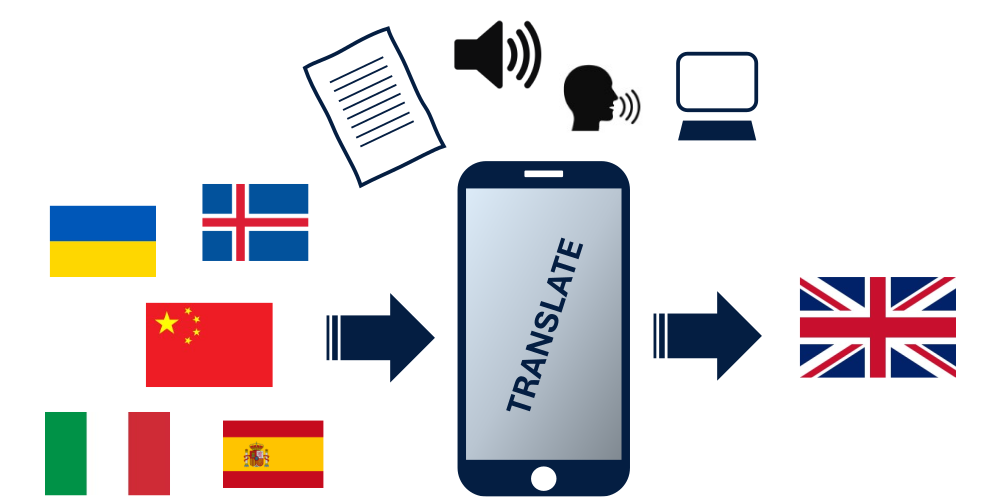
In this post, Dr David August discusses how translation software has become an integral part of university life, with many individuals now relying on software to help with everything from grammar to the full translation of course materials. David build’s on his Learning and Teaching Conference poster to explore some of these experiences within the School of Chemistry and the observed impact of translation software on the student experience. David August is a Senior Lecturer in Chemical Education and Director of Students at the School of Chemistry. This post is part of the ‘Transformative Assessment and Feedback’ Learning and Teaching Conference series.
Alongside generative artificial intelligence (AI) technologies, modern translation software has rapidly evolved from producing static unreliable outputs to fast and accurate translations. Translations can now be readily applied to video, audio and in-person conversations—often live at the press of a button. This software, such as Google Translate or DeepL, is often free, widely available and easy to use.
At first glance, this is a fantastic resource, levelling the playing field for non-native English speakers within UK Higher Education and enhancing cross-cultural communication. The University of Edinburgh’s highly varied and international community can easily communicate with less concern about shared languages or tricky regional accents.
However, anecdotal observations in my role supporting international MSc students suggest that there may be a number of overlooked or indirect impacts on the student experience. A growing dependency of students using these systems may be leading to concerns about English language development, assessment processes, safety and a sense of community.
Language skills
The most obvious impact I have experienced is a reduction in the development of individuals’ English language skills throughout a degree programme. Many students are simply becoming so dependent on translation software to complete everyday tasks that they no longer engage with using their own English language skills in any meaningful way. All course content, including lecture recordings can be directly translated with ease and even in-person events, such as meetings with project groups, academic staff or student advisers can be live translated via a suitable device. Sadly, whilst this approach can solve immediate communication issues, this can lead to long term consequences for students—potentially resulting in failure under exam conditions later in the year.
Coursework and assessment
For coursework that does enable (and not necessarily allow) access to translation software, there is also the growing question of assessment suitability and rigour. Setting the larger discussion about the impact of generative AI aside, many marking criteria still contain references to “grammar”, “spelling” or “readability”. Given the accessibility of translation or “spell check” tools for all students, should we avoid putting any emphasis on English grammar in marking criteria? Or alternatively impose much higher expectations given how easy this is to check and correct?
Safety
Laboratory education is often considered paramount to a Chemistry degree, and of significant importance for many STEM disciplines. Access to translation software and electronic devices is usually restricted in these settings, and yet effective communication is essential for the safety of all participants. With some students becoming ever more reliant on translation software, there is an ever-increasing risk to all users in the lab due to misunderstandings regarding instructions or mislabelling of samples.
Sense of community
Overcoming language difficulties is a significant step in breaking down barriers between groups of students and developing a vibrant community with a sense of belonging. Whilst software can help facilitate effective communication between different languages or cultural backgrounds, this is often outweighed by fewer incentives to improve personal language skills. The result is that some students remain within their own close cultural groups—avoiding the use of English at all costs.
The impacts of translation software are varied and complex. Whilst a lot of research has been carried out into the direct impact these tools have on language education, the consequences for other subjects and the wider student experience is far less known. We hope to explore these observations in far more detail over the coming years.
Learning a second language is challenging, not to mention the cultural impacts of living and studying in a new country, and I have immense admiration for those who have done so. Let us remember that this is still the case, even with modern technological aids, and we should continue to develop software guidance to effectively support students in their studies and wider university experience.
Current University guidance for students on using GenAI can be found here: Using generative AI in your studies: guidelines for students.
 David August
David August
David August is a Senior Lecturer in Chemical Education and Director of Students at the School of Chemistry. His is currently the Academic Cohort Lead for all chemistry postgraduate taught (PGT) students and the Academic Lead for the School’s new analytical laboratory teaching facilities (ACIS). With a previous background in supramolecular chemistry, his research interests now include the impact of visuospatial skills on chemistry education, laboratory teaching practices and building community in international student communities.


